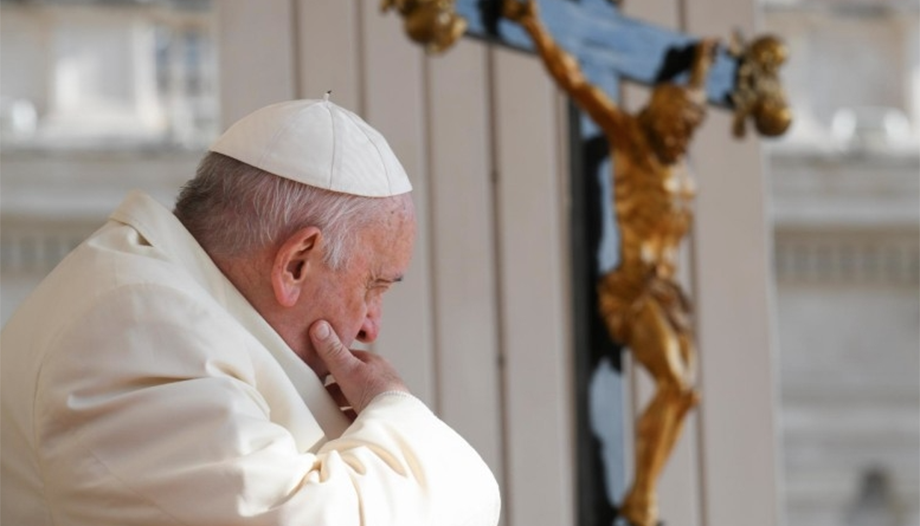In the eleventh catechesis on the passion to evangelize and apostolic zeal, which began in January, the Holy Father reflected this morning in St. Peter's Square "on the martyrs as witnesses to the Gospel." And he placed special intensity on the Missionaries of Charity nuns killed in Yemen in 1998 and in 2016 along with some lay people, "Muslim faithful who worked with the sisters".
The Pope referred first of all to women religious, calling them "martyrs of our time", and then to all Christians, pointing out that "the martyrs show us that every Christian is called to witness to life, even when bloodshed comes to us, making of oneself a gift to God and to one's brothers and sisters, in imitation of Jesus".
"While there are only a few who are asked for martyrdom," the Pope added in the AudienceAll must be ready to confess Christ before men and to follow him on the way of the Cross, in the midst of persecutions, which are never lacking in the Church.
More persecutions today than in the first centuries
Persecutions" that "are not things of that time, today there are persecutions of Christians in the world. There are more martyrs today than in the early days", he pointed out, as on other occasions.
This is what he said at the beginning of the catechesis: "I would like to recall that even today in various parts of the world there are still many martyrs who, in imitation of Jesus, and with his grace, even in the midst of violence and persecution, give the greatest proof of love, offering their lives and even forgiving their own enemies".
"They are the martyrs who have accompanied the life of the Church. Today there are so many martyrs in the Church, so many, because for confessing the Christian faith they are banished from societies, or go to jail. They are so many, eh?"
Then, greeting the Spanish-speaking pilgrims, the Pope asked that "through the intercession of the holy martyrs who proclaimed the faith to the point of shedding their blood, let us ask the Lord that we never tire of being their witnesses, especially in times of tribulation".
Francis, commenting on the Gospel text of St. Matthew 10:16-18, explained that "the word martyrdom comes from the Greek and means to bear witness. The first martyr was Stephen, who was stoned to death for confessing his faith in Christ. Martyrs are sons and daughters of the Church, from different cities, places, languages, nations, who have given their lives for love of Jesus. And this spiritual dynamism that impelled the martyrs takes shape in the celebration of the Eucharist. Just as Christ loved us and gave himself for all, those who participate in the Mass feel the desire to respond gratuitously to this love with the oblation of their own life".
The testimony of blood unites religions
Before beginning a long reference to the religious and lay people killed in Yemen, a country located in the Arabian Peninsula, south of Saudi Arabia, the Pontiff expressly pointed out that he wanted to refer to the "Christian witness present in every corner of the earth: "I am thinking, for example, of Yemen, a land for many years wounded by a terrible war, forgotten, which has left so many dead, and which still causes so many people to suffer, especially children".
"Precisely in this land, there have been luminous testimonies of faith, such as that of the sisters Missionaries of Charitywho have given their lives there. They are still present today in Yemen where they offer assistance to sick elderly and disabled people. Some of them have suffered martyrdom, but others continue to risk their lives, but go on," the Pope continued.
Francis then referred to their spirit of welcome and charity. "They welcome all these sisters of every religion, because charity and fraternity have no boundaries. In July 1998, Sister Aletta, Sister Zelia and Sister Michael, while returning home after Mass, were killed by a fanatic because they were Christians. More recently, shortly after the beginning of the still ongoing conflict, in March 2016, Sister Anselm, Sister Margherite, Sister Reginetet and Sister Judith were killed along with some lay people who were helping them in the work of charity."
"They are the martyrs of our time," the Pope said, with the same words he pronounced in a Angelus of that time, when he said: "These are the martyrs of today. They are not on the front page of the newspapers, they are not news. They are those who give their blood for the Church.
"Among these murdered lay people, in addition to Christians, there were Muslim faithful who worked with the sisters. We are moved to see how the testimony of blood can unite people of different religions. One should never kill in the name of God, because for Him we are all brothers and sisters. But together we can give our lives for others".
Addressing everyone, the Holy Father encouraged: "Let us pray, then, that we will never tire of bearing witness to the Gospel, even in times of tribulation. May all the saints and holy martyrs be seeds of peace and reconciliation among peoples, for a more human and fraternal world, in the hope that the Kingdom of Heaven will be fully revealed, when God will be all in all.








